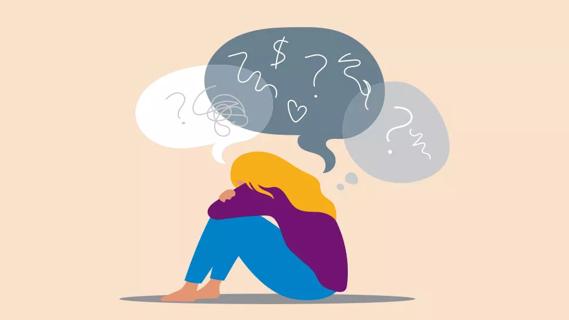Medicine intended for your heart may help in certain anxiety-provoking situations

It’s not uncommon for certain situations to make your heart pump a bit faster or make your hands start a-trembling. Maybe it’s getting on an airplane. Or public speaking. Or taking a big test.
Advertisement
Cleveland Clinic is a non-profit academic medical center. Advertising on our site helps support our mission. We do not endorse non-Cleveland Clinic products or services. Policy
For people who experience situational or performance-related anxiety, beta-blockers (a medication commonly prescribed for heart conditions) can provide some relief.
We talked with psychiatrist Jack Owens, MD, about how beta-blockers work for some people who experience short-lived anxiety in specific situations.
“Beta-blockers work to dampen down the body’s ‘fight-or-flight’ response,” Dr. Owens explains. “Often, when people think of anxiety or a panic attack, it’s accompanied by a racing heart, sweating or shaking. Beta-blockers can work by lessening those symptoms.”
What are beta-blockers, and are they the answer to your anxiety? Dr. Owens breaks it down.
Beta-blockers are some of the most commonly prescribed medications in the United States. Approximately 30 million adults use a beta-blocker. For most people, these medications are prescribed for heart conditions like high blood pressure or an irregular heartbeat.
The U.S. Food and Drug Administration (FDA) approves beta-blockers for treatment of heart-related conditions. Their use for anxiety is considered “off-label use.” That means beta-blockers aren’t specifically intended to be used for performance anxiety, but they can still be legally and safely prescribed for that use.
Advertisement
“‘Off-label’ means that we are using an FDA-approved medication but not necessarily for the condition the FDA approved it for,” Dr. Owens says. “Often, we use off-label medications because a drug has an unintended benefit or because there is some evidence to suggest it is helpful in other circumstances.”
The FDA says that after it approves a medication, it’s able to be used in other situations when medically appropriate.
Research has backed the use of beta-blockers to relieve the physical effects of anxiety, like sweating, shaking or a racing heart.
“When your doctor prescribes you a medication to be used off-label, it’s important to have an open risk-benefit discussion with them,” Dr. Owens advises. “As with any medication, you’ll want to be upfront about any other conditions you have and any other medications you may be taking.”
Beta-blockers slow down certain activities in your cells. Essentially, they work like this:
Beta-blockers work by … well … blocking the receptors that adrenaline is looking for. It’s like a game of musical chairs, where the beta-blocker steals a seat and the adrenaline goes off and sits on the sidelines. If adrenaline can’t bind to your receptors, you don’t get those effects of adrenaline overload.
Dr. Owens says beta-blockers are best used for people who experience anxiety in specific situations, like stage fright for example, rather than for people who live with a diagnosed anxiety disorder.
“Beta-blockers are usually reserved for people who experience anxiety around specific occasions but are otherwise able to function in their capacity,” Dr. Owens notes.
That’s because beta-blockers only deal with the physical effects of anxiety, not any underlying chemical imbalance or psychological reasons for anxiety. In this way, beta-blockers are like a bandage — they’ll stop the bleeding, but they won’t fix the uneven floorboard that you tripped over.
Beta-blockers have been used and studied extensively since the 1960s and are generally well-tolerated by most people. Some people, including those living with asthma, COPD (chronic obstructive pulmonary disease) or diabetes shouldn’t take beta-blockers.
Advertisement
Side effects are usually mild and may include:
Importantly, Dr. Owens says beta-blockers shouldn’t be used without a prescription from your healthcare provider. Your provider will be able to make the best determination as to whether you’re a good candidate for beta-blockers or other medication.
There are other options to help manage your in-the-moment anxiety. Dr. Owens suggests deep breathing techniques as a way to calm your nervous system when you find yourself in an anxiety-provoking situation.
“Controlling your breath is a good way to ‘trick’ your brain,” Dr. Owen explains. “Concentrating on breathing gives the subconscious part of your brain a specific task to do and distracts your mind from runaway thoughts.”
If you experience more chronic anxiety and find that anxiety is keeping you from enjoying your life or going about your day-to-day activities, talk to a healthcare provider. They’ll be able to help you determine a treatment plan that’s right for you.
Advertisement

Sign up for our Health Essentials emails for expert guidance on nutrition, fitness, sleep, skin care and more.
Learn more about our editorial process.
Advertisement

Going home isn’t always easy, but there are ways to ease any stress you might feel

Managing stress can help you sleep more soundly

This fast-acting anxiety medication should never be taken with alcohol, despite what you may see on The White Lotus

Deep breathing, positive mantras and tackling negative thoughts can help get you out of your head and cool down your anxiety

Focusing on what you can see, feel, touch and hear can help you feel more present in the moment

Performance anxiety and stage fright are outsized stress responses that can creep up when you’re put on the spot

A healthy amount of anxiety can keep you safe from harm and motivate you to take action

Although different conditions, they can occur together or cause one another

Even small moments of time outdoors can help reduce stress, boost mood and restore a sense of calm

A correct prescription helps your eyes see clearly — but as natural changes occur, you may need stronger or different eyeglasses

Both are medical emergencies, but they are very distinct events with different causes